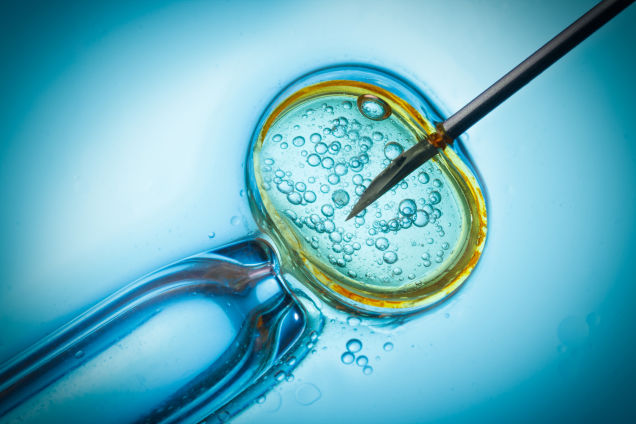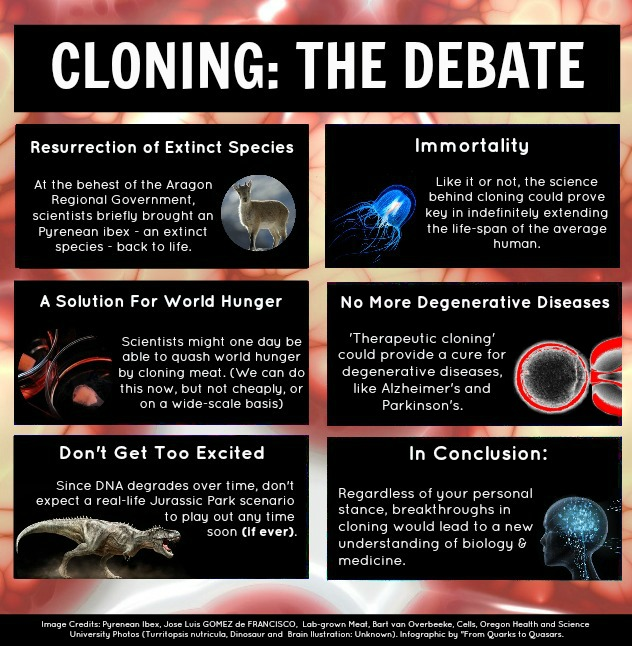Cloning Science and Ethics: Is it Human Nature?
 Developing the Science
Developing the Science
Cloning seems like something right out of a science fiction novel, or movie – and while it most certainly is, the practice has been around for thousands of years already. We weren’t cloning sheep, or humans that far back though – we were cloning plants from cuttings.
As the rapid pace of technology accelerated, more and more experiments took place within the scientific community to clone actual animal life. One of the first successful experiments was by Briggs and King in 1952 and resulted in the cloning of frogs.
They did this via nuclear transfer. It sounds incredibly difficult but it’s actually a very fundamental and simple process: first, the nucleus of an egg is removed and then the nucleus of a donor cell is implanted in its place. When the egg starts to divide, new copies of the older donor cell are produced – resulting in a perfect genetic copy of the original but going through the aging process from the beginning.
In the Spotlight
A little less than 30 years later, two interesting things happened within the span of 2 years: first, David Rorvik (an American Journalist) released a book called “In his Image: The Cloning of a Man” in 1978. The book claimed to follow the development of the first successful human clone and it sparked a huge amount of ethical debate in scientific and public forums alike. Ultimately, most thought the book to be a hoax, but nothing was ever proven one way or the other. The important thing that came from the book was the idea in the public’s mind that cloning of mammals (including humans) was just around the corner, if not possible at the time.
(Retrospectical Podcast Ep. 12 - Are Human Clones an Eventuality?)
The second thing was in 1980, the U.S. Supreme Court ruled that live, human-made organisms are patentable material. They later clarified their ruling.. in 2013 The Supreme Court issued a ruling that banned the patenting of naturally occurring genes but allowed edited or artificially created DNA to be patented. Companies were already starting to monetize our DNA and/or man-made synthetic DNA over 30 years ago! It makes it quite difficult to image what these same (and similar) companies are up to now - and unfortunately a lot of this development is happening behind the closed doors of private businesses rather than transparently.
Human Cloning
Benefits
- Growing new cells for replacement (although this could cause a divide – will people with more means be able to live longer via replacement organs, etc long before we unwashed masses have the technology available to us?)
- Cloning humans with the same genetic makeup in order to act as donors where the organs would not so easily be rejected
- Allowing couples that are unable to have children to reproduce and create their own genetic offspring.
Negatives
- Compromising individuality (how would we treat clones of an original donor? Would they have the same rights and privileges, or be looked upon as lesser citizens of the world? How would they treat themselves?)
- Decline of genetic variation (genetic diversity is one of the things that has allowed animals and humans to survive as long as we have – it fosters adaptation and prevents widespread diseases from wiping out entire species)
- A black market of fetuses, body parts and internal organs (since this is already happening, is it simply an eventuality once the technology gets to the level of cloning at a high-level of success? How would we prevent people from taking the technology into their own hands? Should we?)
- Current low level of fertility (Dolly, the famous sheep that was cloned in 1996, took 277 eggs to produce – 30 initially started to divide, 9 actually induced pregnancy and only one survived to term).
 Little Nicky
Little Nicky
Pet cloning is already here.. cat or dog get run over by a car? If you have the money, you can already have a genetic copy of your dead pet created. One lab says “we have never failed in cloning a specific dog regardless of its size or breed”. There are currently orders and a waiting list. They cost $100,000.
Cloned Food?
While currently not available for public consumption, meat, eggs and milk from cloned animals were recently declared safe by the FDA, a preliminary decision that came after some five years of deliberation. The FDA has yet to decide whether products originating from cloned animals and from their offspring should be labeled as such.
Benefits of Cloned Food
The main benefit of food products originating from cloned animals is that it allows the food industry to have a greater control over the quality and quantity of foods produced. For example, ranchers can perpetuate their best livestock, resulting in a higher production of milk and eggs, as well as tastier meat. A study deemed that the safest animals to clone were cows, followed by pig, goat and sheep.
Side Effects of Cloned Food
While studies have found that young cloned animals are vulnerable to respiratory and cardiovascular problems, some experts believe that the risk to food safety of cloned animals is small. Studies in Japan have also not found any irregularities in cloned animals used for human consumption. However, a recent survey conducted in the United States found that some 60% of its participants had an aversion to consuming cloned food because of ethical reasons

A Forced Future
In 2005, the United Nations General Assembly brought forth a Declaration on Human Cloning (http://www.un.org/News/Press/docs/2005/ga10333.doc.htm) which bans therapeutic cloning (where cells are cloned for therapy of a disease or condition) and reproductive cloning (creating a living genetic duplicate duplicate).
Assuming that our friend David Rorvik was a fraud and did not actually witness the first human cloning experiments back when Mork and Minday was an exciting new TV series, no one has yet come forward with evidence of an actual, viable cloned human having been created. But we do know that it is possible - some notable animals that have already successfully been cloned are: Cats, Cattle, Deer, Dogs, Frogs, Goats, Horses, Mice, Pigs, Rabbits, Sheep and Wolves. We have also successfully created human embryos but they were never allowed to survive past the blastocyst stage (5-10 days after conception).
Scary right? So it’s illegal, but that doesn’t usually stop people from doing things anyway. Science marches on. Do you think that there are currently scientists experimenting and creating viable embryos that last beyond the blastocyst stage? Do you think that there have already been cloned humans and that we are just not on the short list of people to be informed of their successes?
Recent Articles
-
NFL Confidence Pool Picks & Strategy 2024 - Week 18
 To say this has been a year of uncertainty is an understatement. So many injuries, coaching changes, player issues shaped…in Fantasy Football / NFL
To say this has been a year of uncertainty is an understatement. So many injuries, coaching changes, player issues shaped…in Fantasy Football / NFL -
NFL Confidence Pool Picks & Strategy 2024 - Week 17
 Christmas is indeed the time of giving. And this year, the NFL is giving us a double-header on Christmas Day…in Fantasy Football / NFL
Christmas is indeed the time of giving. And this year, the NFL is giving us a double-header on Christmas Day…in Fantasy Football / NFL -
NFL Confidence Pool Picks & Strategy 2024 - Week 16
 Normally, being just a few weeks away from the end of the season, playoff positions are solidified and we need…in Fantasy Football / NFL
Normally, being just a few weeks away from the end of the season, playoff positions are solidified and we need…in Fantasy Football / NFL -
NFL Confidence Pool Picks & Strategy 2024 - Week 15
 Finally! They’re done! We are heading into week 15 and FINALLY we are done with bye weeks! 16 games a…in Fantasy Football / NFL
Finally! They’re done! We are heading into week 15 and FINALLY we are done with bye weeks! 16 games a…in Fantasy Football / NFL
 Please wait...
Please wait...